Player evaluation is as much art as science. All players will be better at some things than others. Questions of talent and system intermingle. How many downsides are too many to carry just because a player has one particularly great skill? How much of a great match, or month, or season is the result of playing in a system that flatters a player’s skills and hides their faults? How much of that performance will translate in a new system? Too often, all of that gets flattened into a simple, impossible question to answer. How good is this player? That flattening makes good player analysis more difficult. Unsurprisingly, statistics are an effective way of more accurately framing the discussion. Two players this season illustrate that dynamic in opposing ways. On one side there’s Chelsea striker Alvaro Morata. He’s developed a reputation as underwhelming, and even on his best days he manages to leave Chelsea fans feeling cold. Like last weekend, for instance, when he scored two goals in Chelsea’s 3-1 win over Crystal Palace but also managed to miss a golden chance at a hattrick after being played clean through on goal in the dying minutes. On the flip side there’s Arsenal midfielder Lucas Torreira, a young, promising tenacious presence in the center of the field. The excitement over Torreira’s genuine talent is understandable but it also glosses over some real holes in his game. It’s easy to ignore the possible drawbacks when a player makes an early successful impact.
Morata Scores Goals
There is one thing that Alvaro Morata is good at. He puts the ball in the back of the net. You don’t need any fancy stats to understand that. It’s a particularly crowded top of the scoring table this year in the Premier League, but Morata’s five goals puts him only two behind the league leaders. Although with three players at seven, and six players with six, that’s not that impressive. Adjust for minutes played (and the fact that Morata doesn’t take penalties) and things look even better. He’s fourth in the Premier League (among players with at least 500 minutes payed) with 0.71 non-penalty goals per 90 minutes. If you do want to look slightly deeper, his expected goal numbers are awesome as well this season, with 0.63 xG per 90. That’s the second highest in the Premier League, behind only Sergio Aguero. 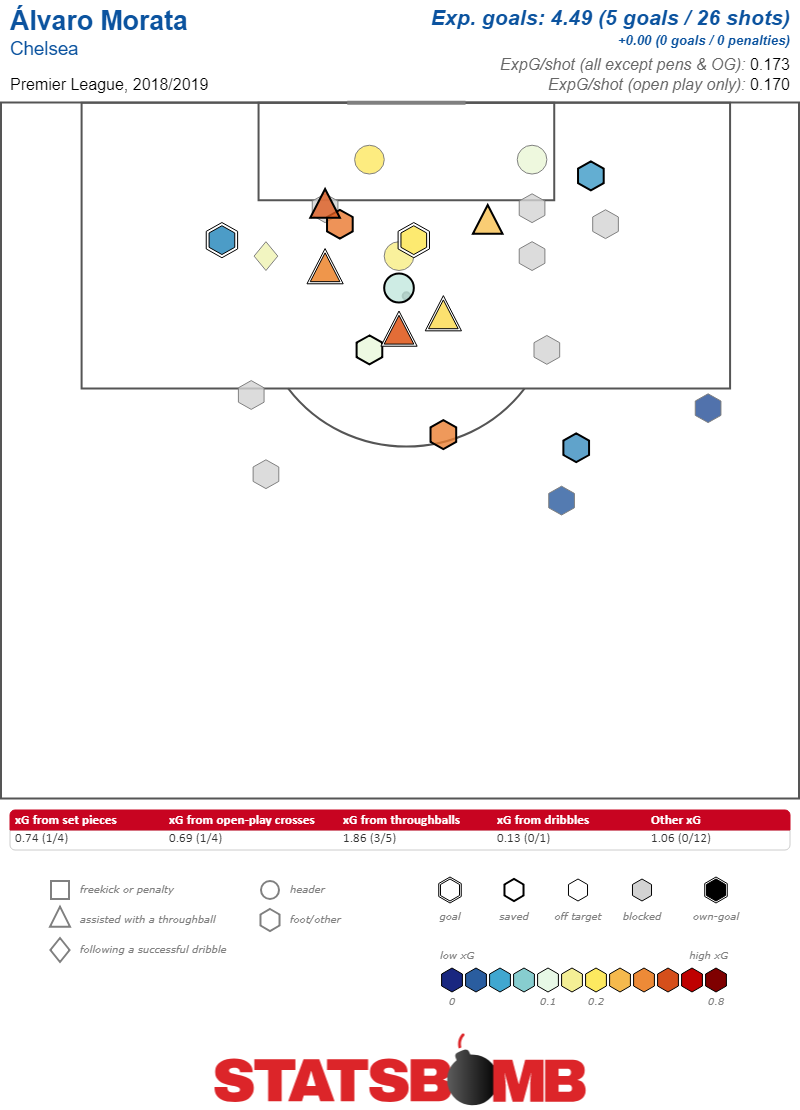 None of this is to say that there aren’t things about Morata to criticize. His scoring rate is great, but historically he’s never put up a monster season. He’s only hit double digits twice, and maxed out at 14. He’s never been the primary striker on a team for a whole season, and when he was given the opportunity last year he faded badly (perhaps assisted by injury) down the stretch. At 26 years old it’s certainly fair to winder when, and if, Morata will translate those impressive scoring rates into an entire season of success. Also, at least under Maurizio Sarri’s management, scoring goals is about all that Morata does. While over the course of his career he’s been at least competent at linking play around the penalty box, last year he had six assists, this season his goal scoring is all he’s bringing to the table. He’s not impressive in the air, his hold-up play seems to rely on falling down and asking for fouls, and while he’s a decently effective presser, he’s not a particularly active one. Compare him with Olivier Giroud and what you find is one player who does a lot and scores some goals, and another player who does a little, but scores a lot.
None of this is to say that there aren’t things about Morata to criticize. His scoring rate is great, but historically he’s never put up a monster season. He’s only hit double digits twice, and maxed out at 14. He’s never been the primary striker on a team for a whole season, and when he was given the opportunity last year he faded badly (perhaps assisted by injury) down the stretch. At 26 years old it’s certainly fair to winder when, and if, Morata will translate those impressive scoring rates into an entire season of success. Also, at least under Maurizio Sarri’s management, scoring goals is about all that Morata does. While over the course of his career he’s been at least competent at linking play around the penalty box, last year he had six assists, this season his goal scoring is all he’s bringing to the table. He’s not impressive in the air, his hold-up play seems to rely on falling down and asking for fouls, and while he’s a decently effective presser, he’s not a particularly active one. Compare him with Olivier Giroud and what you find is one player who does a lot and scores some goals, and another player who does a little, but scores a lot. 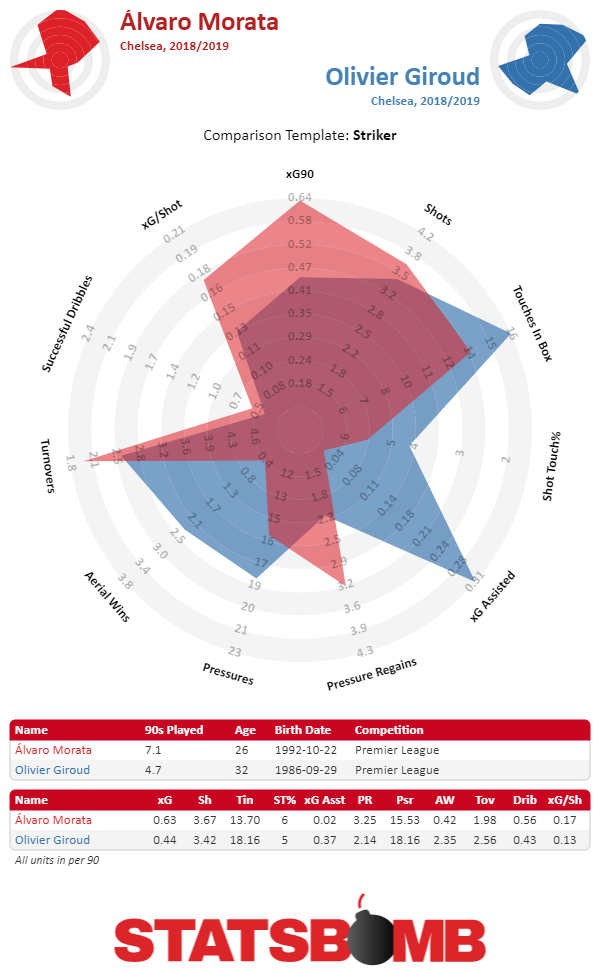 The question isn’t about whether Morata is good or bad, the question is how good does Morata have to be at the things he is good at to make it worth carrying the thing’s he’s bad at. Right now, he’s clearly on the plus side of the equation. In the minutes he’s played he’s a top two expected goal scorer and a top four goal scorer. But, at some level, even as he remains a good goal scorer, everything else would make him not worth the goals. If he was the seventh best goal scorer in the league would it be worth it? The tenth best? There’s no definitive answer here, and the question is complicated by all sorts of other factors. Having a goal scorer is more important if nobody else is scoring goals. Tactically, if Hazard is supposed to be taking shots, rather than creating them, that would impact the decision. If the midfield is supposed to be generating goals by running beyond the striker into the box then Morata’s contributions become less valuable, and Giroud’s get more important. These are all things to consider when deciding how worthy Morata is of a starting spot. Judging Morata is important, it’s equally important to make sure we’re judging him by the right criteria. He’s good at scoring goals, not bad. He’s bad at things that aren’t goal scoring. How good does he have to be at the first thing to balance out the second thing? That’s the question that managers get paid the big bucks to answer. Lucas Torreira’s Boring Passing The opposite phenomenon is going on with Torreira. Torreira looks like a strong signing for Arsenal. He’s done a great job at bringing stability to the middle of the pitch. He’s made midfield partner Granit Xhaka look less like a defensive liability, covered for the fullbacks and just generally been an all around calming and effective presence in Arsenal’s midfield. That’s a skill that’s especially salient for a team whose midfield has consistently gotten overrun for a generation. He’s also not a particularly creative passer. First, the good stuff. He’s ninth in the league in interceptions adjusted for possession with 1.96 and tackles adjusted for possession with 2.95. If your looking for Arsenal’s ball winner, it’s Torreira.
The question isn’t about whether Morata is good or bad, the question is how good does Morata have to be at the things he is good at to make it worth carrying the thing’s he’s bad at. Right now, he’s clearly on the plus side of the equation. In the minutes he’s played he’s a top two expected goal scorer and a top four goal scorer. But, at some level, even as he remains a good goal scorer, everything else would make him not worth the goals. If he was the seventh best goal scorer in the league would it be worth it? The tenth best? There’s no definitive answer here, and the question is complicated by all sorts of other factors. Having a goal scorer is more important if nobody else is scoring goals. Tactically, if Hazard is supposed to be taking shots, rather than creating them, that would impact the decision. If the midfield is supposed to be generating goals by running beyond the striker into the box then Morata’s contributions become less valuable, and Giroud’s get more important. These are all things to consider when deciding how worthy Morata is of a starting spot. Judging Morata is important, it’s equally important to make sure we’re judging him by the right criteria. He’s good at scoring goals, not bad. He’s bad at things that aren’t goal scoring. How good does he have to be at the first thing to balance out the second thing? That’s the question that managers get paid the big bucks to answer. Lucas Torreira’s Boring Passing The opposite phenomenon is going on with Torreira. Torreira looks like a strong signing for Arsenal. He’s done a great job at bringing stability to the middle of the pitch. He’s made midfield partner Granit Xhaka look less like a defensive liability, covered for the fullbacks and just generally been an all around calming and effective presence in Arsenal’s midfield. That’s a skill that’s especially salient for a team whose midfield has consistently gotten overrun for a generation. He’s also not a particularly creative passer. First, the good stuff. He’s ninth in the league in interceptions adjusted for possession with 1.96 and tackles adjusted for possession with 2.95. If your looking for Arsenal’s ball winner, it’s Torreira. 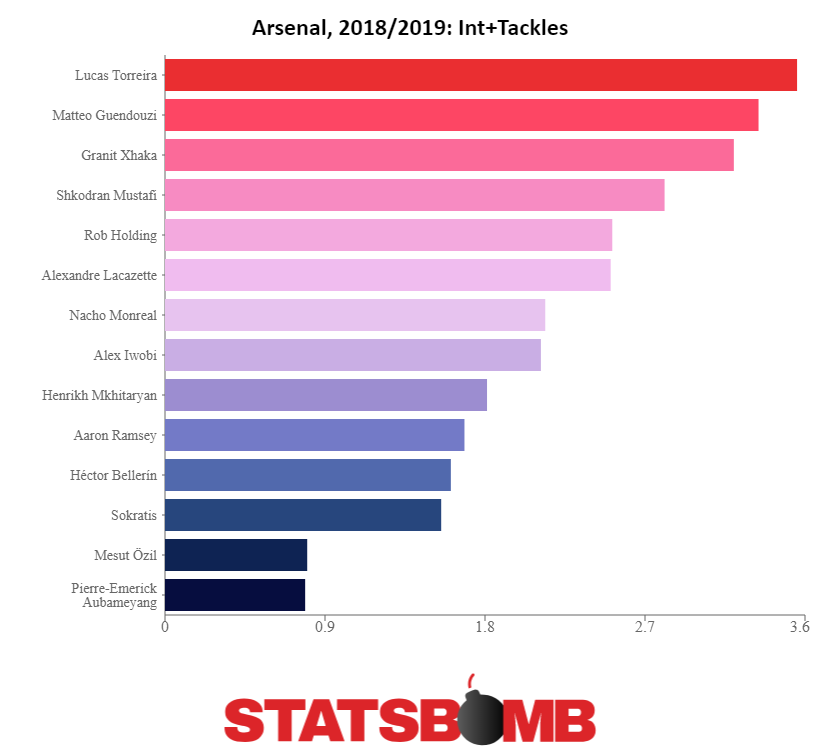 He primarily patrols the center of the pitch, but also covers the right flank, which is particularly important given manager Unai Emery’s insistence on having his fullbacks bomb forward in order to create attacking chances.
He primarily patrols the center of the pitch, but also covers the right flank, which is particularly important given manager Unai Emery’s insistence on having his fullbacks bomb forward in order to create attacking chances. 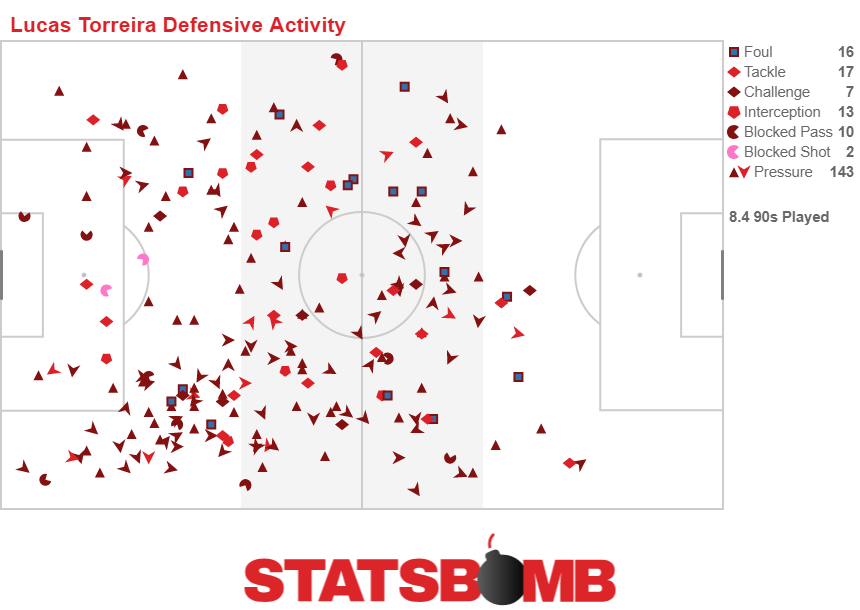 These are all great and important and necessary skills for Arsenal to have in midfield. They need these things. They need them so much that it’s absolutely reasonable to overlook Torreira’s lack of creativity on the ball. But, that doesn’t mean that Torreira’s lack of creativity isn’t a real part of his game. He only notches 4.86 deep progression per 90, well down below the team’s creators in midfield.
These are all great and important and necessary skills for Arsenal to have in midfield. They need these things. They need them so much that it’s absolutely reasonable to overlook Torreira’s lack of creativity on the ball. But, that doesn’t mean that Torreira’s lack of creativity isn’t a real part of his game. He only notches 4.86 deep progression per 90, well down below the team’s creators in midfield. 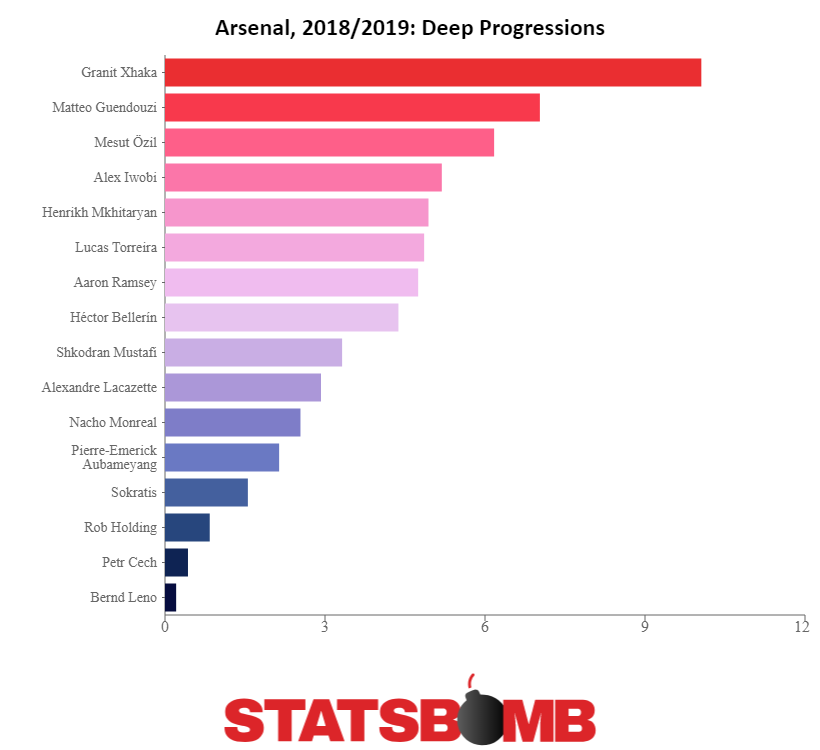 On the other hand, with a 90% completion rate he’s the most consistent passer on the team. Combine the two and what you have is a player who is very conservative on the ball. Looking at some recent performances it’s clear that the lion’s share of Torreira’s passing is sideways and backwards. Here he is against Crystal Palace (skipping past the strong defense of Liverpool last weekend to give Torreira the benefit of the doubt).
On the other hand, with a 90% completion rate he’s the most consistent passer on the team. Combine the two and what you have is a player who is very conservative on the ball. Looking at some recent performances it’s clear that the lion’s share of Torreira’s passing is sideways and backwards. Here he is against Crystal Palace (skipping past the strong defense of Liverpool last weekend to give Torreira the benefit of the doubt). 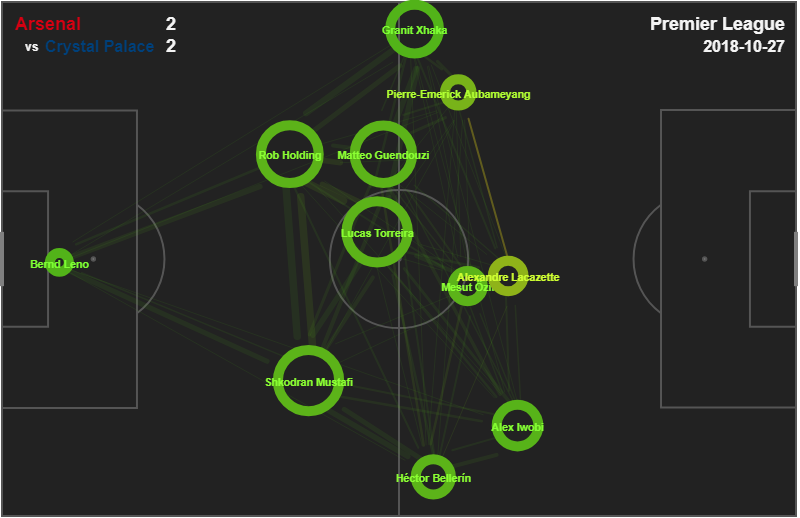 His most frequent passes were 11 to Shkodran Mustafi, 11 to Granit Xhaka (playing leftback, which admittedly makes everything weird) and 10 to Rob Holding. The week before against Leicester City, in a much better attacking performance, the pattern was the same with 15 to Mustafi, 12 to Xhaka and 11 to Bellerin. None of this is bad. There are lots of very successful defensive midfielders who profile this way. Win the ball back, settle possession with safe passes, be an option to rotate possession, and don’t make stupid mistakes. That’s the recipe for a very good player. It’s also somebody who needs to be surrounded with passing to succeed. Torreira has slotted comfortably into Arsenal’s side in no small part because he’s playing lots of minutes with Xhaka next to him and Mesut Ozil in front of him, two players who do just about all the creative passing you could ever need. If you took those players out of the lineup, and replaced them with, say, somebody like Aaron Ramsey, then Torreira would look different. Ramsey’s skill comes from getting forward without the ball, and having a creative passer feed it to him. Put Torreira in that role and all of a sudden Arsenal would begin to struggle. In the same way that Chelsea have to reckon with exactly how much scoring they need from Morata to overshadow all the things he can’t do, Arsenal have to consider how little passing they can abide from Torreira before that becomes a liability for their attack. Given the current makeup of the squad the answer to that question is that they need basically no passing from Torreira, and they’ll still be able to move the ball. That’s part of what’s allowed Torreira to seem so successful so quickly. Should that squad chance, however, then they might be forced to reconsider. There’s a lot more to life than whether a player is good or bad. What’s more important is figuring out what a player is good and bad at, and how often they are forced to use those skill given the system they’re playing in. Those are the questions that color how we think about players like Morata and Torreira, and how perceptions of them can, and will change over time. Morata’s a good goal scorer, but sometimes that doesn’t matter. Torreira’s not a good creative passer, and that hasn’t mattered yet either. Understanding that goes a long way to help figuring out everything else.
His most frequent passes were 11 to Shkodran Mustafi, 11 to Granit Xhaka (playing leftback, which admittedly makes everything weird) and 10 to Rob Holding. The week before against Leicester City, in a much better attacking performance, the pattern was the same with 15 to Mustafi, 12 to Xhaka and 11 to Bellerin. None of this is bad. There are lots of very successful defensive midfielders who profile this way. Win the ball back, settle possession with safe passes, be an option to rotate possession, and don’t make stupid mistakes. That’s the recipe for a very good player. It’s also somebody who needs to be surrounded with passing to succeed. Torreira has slotted comfortably into Arsenal’s side in no small part because he’s playing lots of minutes with Xhaka next to him and Mesut Ozil in front of him, two players who do just about all the creative passing you could ever need. If you took those players out of the lineup, and replaced them with, say, somebody like Aaron Ramsey, then Torreira would look different. Ramsey’s skill comes from getting forward without the ball, and having a creative passer feed it to him. Put Torreira in that role and all of a sudden Arsenal would begin to struggle. In the same way that Chelsea have to reckon with exactly how much scoring they need from Morata to overshadow all the things he can’t do, Arsenal have to consider how little passing they can abide from Torreira before that becomes a liability for their attack. Given the current makeup of the squad the answer to that question is that they need basically no passing from Torreira, and they’ll still be able to move the ball. That’s part of what’s allowed Torreira to seem so successful so quickly. Should that squad chance, however, then they might be forced to reconsider. There’s a lot more to life than whether a player is good or bad. What’s more important is figuring out what a player is good and bad at, and how often they are forced to use those skill given the system they’re playing in. Those are the questions that color how we think about players like Morata and Torreira, and how perceptions of them can, and will change over time. Morata’s a good goal scorer, but sometimes that doesn’t matter. Torreira’s not a good creative passer, and that hasn’t mattered yet either. Understanding that goes a long way to help figuring out everything else.
